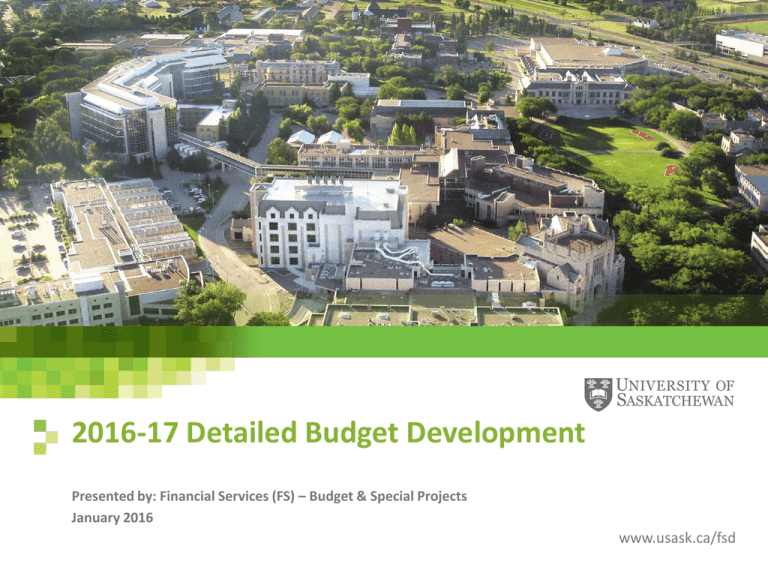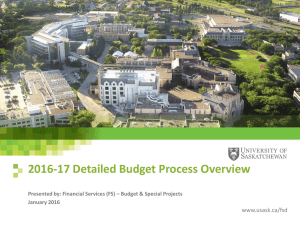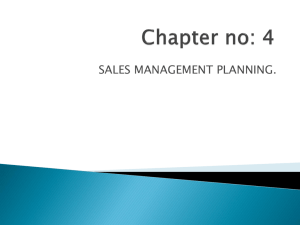2016-17 Detailed Budget Development www.usask.ca/fsd January 2016
advertisement

2016-17 Detailed Budget Development Presented by: Financial Services (FS) – Budget & Special Projects January 2016 www.usask.ca/fsd U of S Budget Process Overview … Jun 15 July 15 … Nov 15 Dec 15 Jan 16 Feb 16 Mar 16 Apr 16 May 16 Integrated Planning Process Multi-Year Budget Framework Resourcing Discussions 16/17 = PCIP approval = Board approval Detailed Budget Process (including final resourcing decisions) 16/17 Operations Forecast 17/18 Ongoing monitoring of: key assumptions, actual results Jun 16 Jul 16 University Revenues Central Operating Budget – Revenue Sources Central Operating Budget Revenues: Historic Range Provincial operating grant (includes targeted funding) 65% - 70% Tuition 20% - 25% Interprovincial funding (WCVM) 4% - 6% Investment income 2% - 5% Other revenue 1% - 2% Total 100% Allocations from Central Operating Budget Allocations from Central Operating Budget: Historic Range Funding envelopes to academic units* 60% - 65% Funding envelopes to support units* 18% - 23% Funding envelopes to institutional initiatives* Institutional expenses paid centrally Total * Surpluses/deficits stay with the unit/initiative 5% - 7% 8% - 12% 100% Expenses Covered – By Type Expenses Covered by Operating Budget: Historic Range Salaries and benefits 60% - 65% Targeted and directed initiatives 15% - 20% Other non-salary operating expenses 10% - 15% Utilities 3% - 5% Additional pension and LTD payments 1% - 2% Total 100% Detailed Operating Budget - Objectives Support University governance/stewardship Mechanism for units to plan, manage, and monitor their financial resources Includes operating allocation as determined from resourcing decisions (envelope) Developing realistic budgets to reflect the unit’s planned activities for the upcoming year Update the institutional multi-year budget framework Update and apply consistent budgeting principles across units Resourcing Decisions Historical Incremental Responsibility Center Management Budgetary responsibilities are becoming more decentralized Expenses do not drive operating allocation Operating allocation provided as an “envelope” that supports the core teaching and support activities of the unit Envelope funding based on strategic factors and alignment of unit priorities with institutional priorities Resourcing Decisions – cont’d Determination of 16/17 envelopes Three sources of operating revenue allocated to units: provincial grant, targeted funding for specific initiatives, tuition (TABBS-based) PCIP has approved 1% increase on provincial grant component 16/17 projected envelopes, which includes PCIP-approved adjustments, will be communicated in February 2016 (subject to Board approval in June 2016) Resourcing Decisions – cont’d RCM Phases 15/16 – strategic resource allocation and envelope funding • • • Partial reinvestment of FIRP savings Further development of strategic envelope (includes APF, etc.) TABBS model refinements underway 16/17 – TABBS-based tuition allocated to revenue centres Next steps: • • Consultations with Unit Heads regarding next phases of RCM transition Consideration of other TABBS model components (i.e. indirect costs, provincial grant) Detailed Budget – Key Principles Comprehensive Budgeting Units to determine which positions and non-salary expenses are funded from envelope (operating allocation for core teaching and support activities) Fund clean-up and simplification – contact Controller’s Office Funds with accumulated surpluses – Reserves Policy Does not have to be tied to prior year Total envelope-funded expenses should align with total envelope available All other expenses should be designated as non-base budget, fund balance, fee-forservice, recovery, grant, and other Not funded from envelope (operating allocation) Must budget associated revenue sources (e.g. grants/contracts, internal and external sale of goods/services, interfund transfers) to offset these expenses Envelope Funding (59008) Starting with 16/17 detailed budget, units can modify operating allocation budgets (account 59008) in Budget Development Effective planning and management of financial resources for unit Operating allocation based on ongoing changes as of November 30, 2015 by CFOAPAL rolled forward into Budget Development as starting point Projected envelopes that include PCIP-approved adjustments will be communicated on February 2016 Total budgeted vs. final Board-approved envelope funding a) Differences, if any, will be adjusted in the main unit fund/org Items to Consider for 16/17 Detailed Budget Salary Budgeting Salary adjustment pools for unknown salary changes - $1 placeholder Account for employee turnover and attrition as much as possible Electronic data extract of worksheets available upon request (hardcopy with changes noted must be submitted to Budget Management) Refer to Salary Parameters/Full Position Costing and Benefit Parameters on FS Budgeting page as required Non-Salary Budgeting Spending allocation budgets entered in Budget Development in late January Interfund transfer budgets clean-up – use of other applicable accounts besides 80006 Summary of Key Dates Important dates for the 16/17 Detailed Budgeting Process: Position and Salary Verification Worksheets: Issued to units on December 18, 2015 Due back to Budget Management on February 29, 2016 Budget Development (non-salary, revenues, recoveries, transfers): Opened to units on December 18, 2015 Closes on February 29, 2016 Budget Upload into UniFi – June 2016 (after PCIP and Board approval) Budget Packages to Units – July 2016 Five-Year Rolling Forecasts New multi-year budgeting tool introduced to colleges/schools in 14/15 Extended to support units in 15/16 High-level financial representation of existing resources, strategic direction, and planned expenditures Enhance understanding of financial resources Guide planning discussions with Provost/PCIP and development of detailed budgets How can we better support you? FS Website (Budgeting page) New budget cycle (16/17) communications will be posted on Budgeting page as they are issued Includes training materials and other budget-related resources Link: www.usask.ca/fsd/colleges_depts_research/budgeting.php Contact Information Budget Management: Piya Sen, Director 966-8756 piya.sen@usask.ca Kris McWillie, Manager 966-2798 kris.mcwillie@usask.ca Lucy Vuong, Analyst 966-2206 lucy.vuong@usask.ca Lorraine Shantz, Analyst 966-1398 lorraine.shantz@usask.ca Justine Marchuk, Analyst 966-4770 justine.marchuk@usask.ca ICT Training: Siu-Ching Fong, UniFi Training & Support phone: 966-8783 email: unifisupport@usask.ca Questions or Comments?



